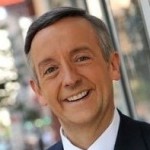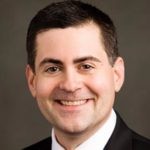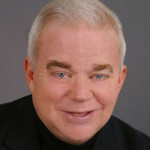A Southern Baptist pastor who has been supportive of GOP presidential front runner Donald Trump says leaders of an “evangelical elite” vocally opposed to Trump are out of touch with people in the pew.
“There is an absolute disconnect between the evangelical elite leadership and the average person in the pew,” Robert Jeffress, pastor of First Baptist Church in Dallas, said during the March 15 episode of the To the Point program on Public Radio International.
“The evangelical elite leadership just doesn’t get it,” Jeffress said, interpreting numbers showing Trump’s support among evangelical leaders nearly nil while he is polling 37 percent among those who identify as evangelical voters.
The 33-minute program about what is happening to the so-called “values voters” in the current election brought in interviews with Russell Moore, head of the Southern Baptist Convention Ethics and Religious Liberty Commission; Barna pollster David Kinnamon; Religion Dispatches journalist Sarah Posner and Jim Wallis of Sojourners.
Moore, a frequent Trump critic, said in remarks recorded prior to the live broadcast that he is concerned about evangelical leaders who “have tossed aside everything that they previously said they believed in order to embrace and to support the Trump candidacy.”
“I am less concerned about what happens in the political tumult of the country than I’m concerned about what evangelicalism is about, which is ultimately a commitment to the gospel of Jesus Christ, and I see that being obscured this year,” Moore said.
“When you have some leaders pronouncing Donald Trump to be a Christian — despite the fact that he openly boasts and brags about adulterous affairs and uses racially tinged and derogatory speech and a thousand other things, and says he has nothing for which to ask forgiveness from God — that to me is not a political issue. It is a gospel issue, and that has to do with who evangelicals actually are.”
Jeffress, a Fox News personality who has appeared at several Trump campaign events, reminded listeners about the decision evangelical voters faced during the presidential race in 1980.
“Evangelicals had a choice between two candidates,” Jeffress said. “One choice was a born-again Christian, Sunday school teacher in a Baptist church, who was faithfully married to one woman. His name was Jimmy Carter. The other choice was a twice-married Hollywood actor who as governor of California had signed the most liberal abortion bill in California history, and whose wife practiced astrology and used it to influence him. His name was Ronald Reagan, and evangelicals overwhelmingly went with Ronald Reagan, not because he was the most religious choice, but because he had the quality people felt was necessary at that time, and that was leadership.”
Jeffress said a candidate’s faith is one consideration when choosing a president, “but it’s not the only consideration, and sometimes it’s not the most important consideration.”
When it comes to meeting with world leaders about a nuclear Iran or defeating radical terrorists, Jeffress said, “I couldn’t care less about that president’s tone or his language.”
“I want the meanest, toughest, son-of-a-you-know-what I can find in that role, and I think that’s where many evangelicals are,” he said. “The leaders just don’t get it.”
“I think it’s wrong to say that Donald Trump or anyone who advocates for national security, who wants to build a wall, is somehow not a Christian, as the pope intimated a few weeks ago,” Jeffress continued. “Look, building walls is not non-Christian. God told Nehemiah ‘build a wall around Jerusalem.’ The purpose of that wall was not to keep the Jews from going out but to keep the enemies from coming in.”
Wallis, long identified as a leader in the evangelical left, said in this case he agrees with his friend Russell Moore, accusing Trump of using racial fear and hatred to incite and condone violence.
“Not every supporter of Donald Trump is a racist, I’m sure, but the racists are all supporting Donald Trump,” Wallis said.
“Russell and I would vote different ways on a number of things, but this is a gospel issue here,” Wallis said. “I’m doing a book tour around the country full of evangelicals and young people who regard Donald Trump as contrary to the gospel.”
Jeffress said he thinks a lot of Christians confuse the role of individual Christians and the church to show compassion with the government, which has a different function.
“What I believe is there’s nothing anti-gospel about protecting our nation from those who would do our nation harm,” Jeffress said. “That’s not anti-gospel.”
Jeffress said the fact the gospel is available to everyone regardless of race or national identity “does not negate the fact that a government has a responsibility to protect its citizens.”



